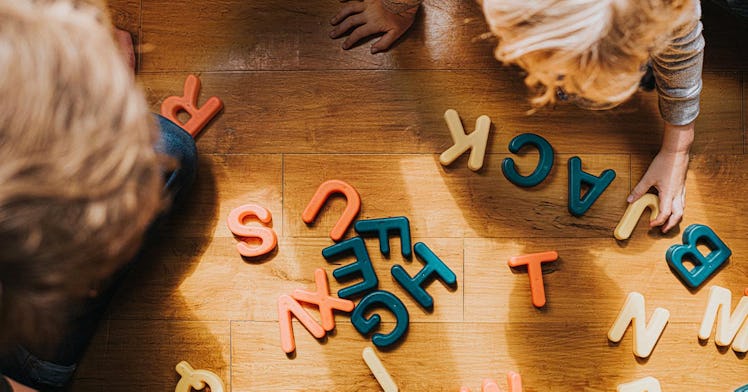Signs Of Dyslexia In Kids: What Parents Need To Know
Children don’t just grow out of being slow readers.

All kids learn to read at a slightly different pace. But when a child falls behind their peers, it could be a sign of dyslexia. Dyslexia affects 15% to 20% of the population, and it’s the most common learning disability by far.
Dyslexic kids often have trouble reading fluently, or rapidly, accurately, and with understanding, says Sally Shaywitz, M.D., a co-founder and co-director of the Yale Center for Dyslexia and Creativity and author of the bestselling book Overcoming Dyslexia. They may think they’re “stupid,” which can give them low self-esteem.
Instead, parents should tell their dyslexic kids they’re part of a special club. After all, they’re joining the roster of dyslexic people that includes Richard Branson, Steven Spielberg, and even Dav Pilkey, author of the Captain Underpants series. Then, get them the help they need.
What Is Dyslexia?
The federal government defines dyslexia as “an unexpected difficulty in reading for an individual who has the intelligence to be a much better reader.” The child’s overall intelligence is key. An incredibly smart kid with dyslexia may have completely average reading abilities, but they could still benefit from diagnosis and treatment.
Included in this definition is that dyslexia is “most commonly caused by a difficulty in phonological processing (the appreciation of the individual sounds of spoken language), which affects the ability of an individual to speak, read, and spell.” In other words, people with dyslexia have trouble paying attention to phonemes — the smallest distinctive sounds that make up words, such as f in the word father.
Signs of Dyslexia
One of the clearest symptoms of dyslexia is trouble with reading, particularly with learning letters and the sounds they make, Shaywitz says. But there are many other signs of dyslexia. They include:
- Poor spelling
- Lack of interest in rhymes
- Difficulty learning foreign languages
- Difficulty paying attention
- Anxiety, particularly about reading aloud in class
- Difficulty with word retrieval, or thinking of and saying the word that you mean to say
- Mixing up similar sounding words when speaking, such as constant and consistent
- Having a larger listening vocabulary than speaking vocabulary
Dyslexia Tests
Ideally, all children should be screened for dyslexia in Kindergarten when they’re learning how to read, Shaywitz says. There are multiple free screening tools that parents and teachers can complete in 10 minutes or less. You can find several here. Screeners don’t diagnose dyslexia, but they can identify whether a child is at risk.
A dyslexia evaluation should include both an IQ test and a reading test, Shaywitz says. This is because dyslexia is measured by unexpected trouble reading in relation to overall intelligence.
You can ask your child’s school district to evaluate your child for dyslexia. If you’re unsatisfied with their testing, you can also seek private evaluation, such as from a reading specialist or psychologist, according to the Child Mind Institute.
Differences between typical readers and dyslexic readers start to appear in 1st grade. Without treatment, the gap widens from there. The sooner a dyslexic child begins to receive treatment, the better their reading skills progress. “You want to reach children who are at risk early on, when reading intervention is maximally effective, before students fall further and further behind,” Shaywitz says.
Dyslexia Treatment and Accommodations
When a student is diagnosed with dyslexia, they can get accommodations for their disability at school. “Accommodations allow you to measure ability. Without accommodations, you’re measuring the disability,” Shaywitz says.
A common accommodation is getting extra time on classwork and tests. Without extra time, a child may not be able to finish. When grading essays, Shaywitz also recommends that teachers grade the ideas in the writing separately from the spelling because kids with dyslexia often excel at the former and aren’t so great at the latter.
Interventions can also boost a dyslexic child’s reading skills, particularly when started early in life. Teachers and parents should focus on helping the child learn phonemes, or the sounds that make up words. One way to do this is through the Orton-Gillingham method, a multisensory way of teaching kids the connections between letters and sounds in individual words.
It’s also important for dyslexic kids to practice reading aloud multiple sentences that are related to one another. One way to do this is through paired reading, in which a parent reads a paragraph out loud alone, then again out loud with their child. Shaywitz recommends practicing paired reading for 15 to 20 minutes at a time, several times per week.
It may also be worth considering sending your child to a school specifically for kids with dyslexia. Most teachers aren’t well-educated on dyslexia, and they may not have time to give dyslexic students the specialized attention they need. However, schools such as the Windward School in New York and Park Century School in Los Angeles are designed to fit the needs of kids with dyslexia.
The Strengths of People With Dyslexia
People often frame learning disabilities in terms of their challenges, and many dyslexic kids might think they’re unintelligent because of their difficulties reading. But they have unique strengths, and it’s crucial that adults highlight them.
“Talk about the things that they do well,” says Linda Siegel, Ph.D., a professor emeritus of Educational and Counselling Psychology and Special Education at the University of British Columbia. “We always try to find the strengths of the children as well as the difficulties.”
Kids with dyslexia often excel at:
- Seeing the big picture
- Reasoning
- Critical thinking
- Listening vocabulary
- Empathy
- Problem-solving
- Acting and drama
- Carpentry and building
- Filmmaking and photography
- Sports, especially individual sports
Make this list a focal point for a frustrated child. “That’s really important for their self-esteem,” Siegel says.